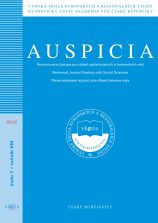Tswanas with AIDS in Potchefstroom, Republic of South Africa: Measuring their Health-Related Quality of Life
Tswanas with AIDS in Potchefstroom, Republic of South Africa: Measuring their Health-Related Quality of Life
Author(s): Paul H. Möller, Petr Petr, Hana KalováSubject(s): Sociology, Health and medicine and law
Published by: Vysoká škola evropských a regionálních studií, z. ú.
Keywords: AIDS; health-related quality of life; HIV; quality of life; subjective quality of life; Tswanas;
Summary/Abstract: Beyond a global definition of quality of life, investigators are now interested in the measurement of the dimensions of quality of life. The objectives of this study were twofold: firstly, to measure and explore, by means of the eight multi-item scales of the SF-36 questionnaire, the quality of life of Tswanas with AIDS in Potchefstroom, Republic of South Africa; and secondly, to determine, according to the SF-36 questionnaire, whether observable health-related quality of life differences exist between them and the Oxford Healthy Life Survey group. The hypothesis that served as a guide to achieving the objectives of the study was the following: According to the eight multi-item domains of the SF-36 questionnaire, observable health-related quality of life differences exist between Tswanas with AIDS and the Oxford Healthy Life Survey group. In order to understand the health-related quality of life of Tswanas in Potchefstroom with AIDS from their point of view, the validated self-administered SF-36 questionnaire, with its eight multi-item domains, was utilized as a research method. According to the information gathered by means of the questionnaire, the health-related quality of life of the Tswanas with AIDS was measured, quantified, described and compared with that of the Oxford Healthy Life Survey, the latter which provided the normative data for the SF-36 questionnaire. It was found that on all scores of the eight domains, the levels of the experience of quality of life of Tswanas with AIDS are observably lower than on the scores of the Oxford Healthy Life Survey. The hypothesis was thus accepted. The biggest observable differences were to be found in the former’s emotional condition, followed by their experience of bodily pain, physical functioning, general mental health, social functioning, physical roles limitation, general health perception and vitality. Effective coping with one’s situation is linked to improved quality of life. It is thus recommended that existing intervention programmes to improve the quality of life of AIDS sufferers should be implemented and innovative and creative cost-effective new programmes should be developed. However, in order for these intervention programmes to be successful in the enhancing of an individual’s physical, psychological and social well-being, they have to reflect changes in values, norms, social structures and facilities.
Journal: Auspicia
- Issue Year: 2005
- Issue No: 1
- Page Range: 16-27
- Page Count: 12
- Language: English

